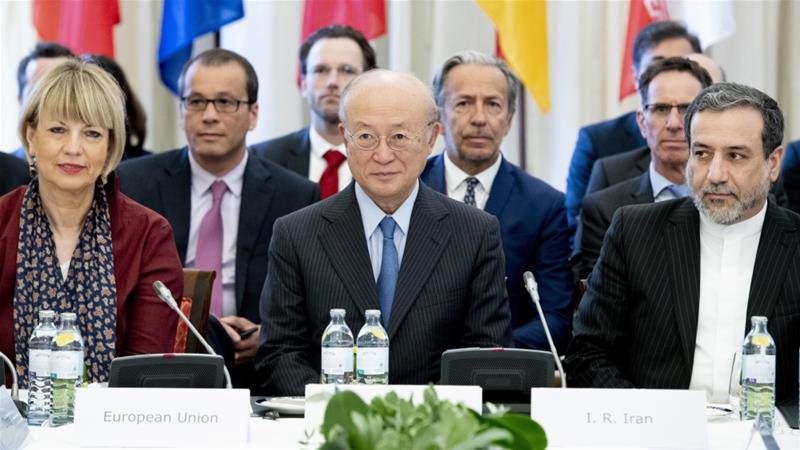Following the United States’ unilateral withdrawal from its Joint Comprehensive Plan of Action (JCPOA) and breach of its commitments, Europe was also incapable of fulfilling its commitment and promises to safeguard Iran’s interests in the JCPOA and compensating for the US sanctions and, at best, had a very poor performance. The Instrument in Support of Trade Exchanges (INSTEX) between Iran and Europe has also failed to meet Iran’s expectations and does not help counter US sanctions.
In the meantime, the United States made its sanctions list against Iran longer, and other tension creating measures were taken by the United States and its allies in the Persian Gulf Cooperation Council and Israel to provoke Iran to initiate military confrontation in the Persian Gulf region.
Meanwhile, Europe’s failure to fulfill its promises about INSTEX and its inefficiency in reimbursement of US sanctions, led Iran to set a 60-day deadline with regard to Notes 26 and 36 of the JCPOA deal in order for the remaining states in the JCPOA to comply with their obligations. During the 60 day period, the step-by-step suspension of Iran’s commitments will be on the agenda. The question now is what would be Europe’s possible responses to this step-by-step suspension and 60-day deadline? And what would be Europe’s flexibility against gradual suspension of Iran’s JCPOA commitments.
For a possible European response at the end of the 60-day deadline set by Iran, there are two general scenarios: Resuming the strategy of getting the finger on the trigger, or a change in the current approach and full compensation of US sanctions against Iran in the financial-trade area and strengthening of INSTEX and other possible channels. The other scenarios can be imagined somewhere is in the middle of the two scenarios and based on a combination of their elements.
The EU rejected Iran’s 60-day deadline in its first response and while declaring its commitment to the JCPOA urged Iran to comply with its commitments and asked the IAEA to monitor Tehran’s nuclear activities. However, for the sake of credibility of its 60-day deadline it increased its enriched uranium reserves to over 300 kg. Europe’s reaction to this 60-day Iranian deadline was to announce refusal to activate the trigger mechanism or the return of UN sanctions against Iran. Along with this action-reaction game between Iran and the EU, the United States is still adding to its sanctions list and has adopted a policy of repeated threats against Iran.
On this side of the game, Iran by declaring the 60-day deadline showed that its strategy of tolerance towards the laxity of the foreign parties towards their JCPOA commitments has turned to a practical strategy and by crossing the 300-kg reserve level has sent a real signal that its threat was not empty.
At present, the main platform of the JCPOA’s survival or death lies between Iran and the European Union. Although other actors, such as China and Russia support Iran, but the main burden of the JCPOA commitments is on the shoulder to the European Union which sometimes tilts towards the stances adopted by the United States. This tendency or leverage comes out of France’s mouth (the bad cop of the final round of the talks).
Meanwhile, Russia has its own concerns about the issues of Ukraine and Crimea in terms of the EU pressures in the form of sanctions, and therefore Moscow cannot be a very effective player in this respect. The UK also has positions closer to the United States with the prospect of fulfilling the Brexit. Nonetheless, the EU’s flexibility towards Iran’s 60-day deadline has been influenced by the financial-trade ties between Europe and the US and the huge volume of trade exchanges between the two continents. Accordingly, the return of “finger on the trigger” scenario by the European Union at the end of the 60-day Iranian deadline is more likely to materialize.
In fact, Iran is involved in two different games, so that the returns of both games are contingent; on the one hand, the confrontation between Iran and the United States evokes a kind of ‘chicken game’; each side that surrenders earlier must give more concessions.
On the other side, the game with Europe is a game of trust; a tendency for more cooperation by Europe would depend on the American decision in the direct game with Iran. The huge profit made by American companies from arms sales in the Middle East on the one hand, and the growing dependence of China on the United States for oil imports due to the sanctions on Iran’s oil sales, on the other hand, are parameters that make it difficult to forecast the end of the game or its stop and turning it into a game with better conditions at least until the next American president is elected. Hence, the optimal option for Iran is the design of a scheme based on contingent strategies and different layers of players in the game to be implemented at the end of the 60-day deadline.










0 Comments